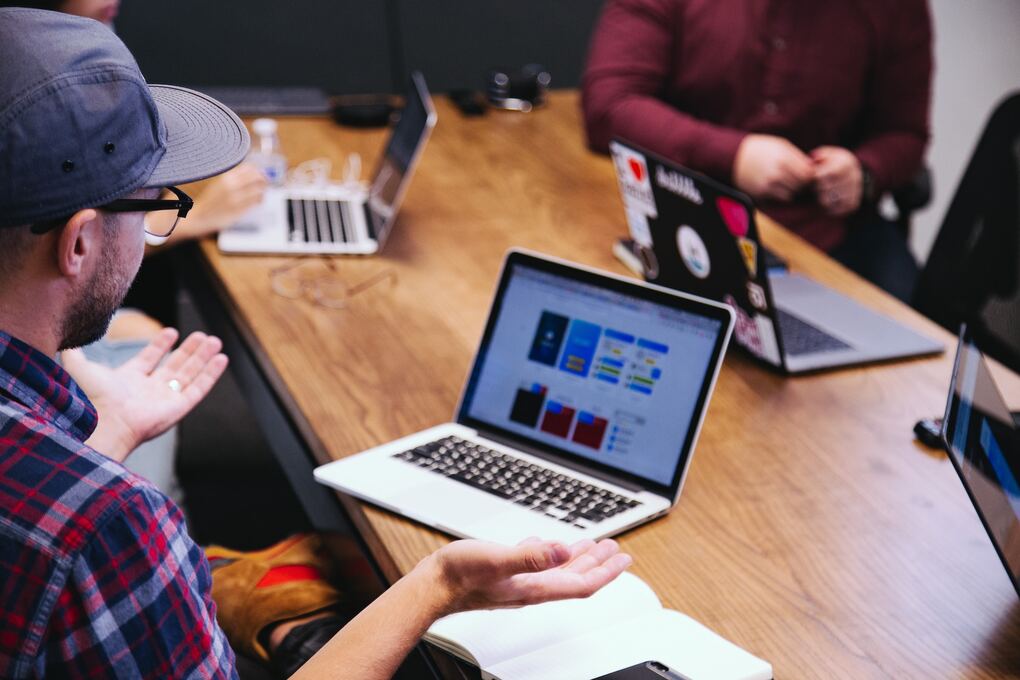Study Music Business | Ultimate Guide
Find out more about the music business and how studying can help elevate your career...
The music business can be a complicated entertainment industry to make sense of with many different companies, professionals, artists and huge amounts of music all competing to stand out.
From music marketing for songwriters to music publishers working with recorded music alongside the events industry and the influence of modern technology and legal issues, there are many elements of the industry that make the whole - and myriad new music business companies alongside music business roles to understand.
Our music business study ultimate guide will explore the business, how musicians can find their brand identity, record deals, artist management and much, much more.
Studying Music Business at ICMP
Our School of Music Business runs some of the best and most current music business courses in the UK. The courses have been meticulously designed around the needs of the modern music industry and are filled with the latest information, practical tips and highest standards of education to ensure you are able to take your career to the next level within the sector.
Those wishing to study a three-year Music Business degree at ICMP can choose from:
- BA (Hons) Music Business and Entrepreneurship,
- BA (Hons) Live Event Management,
- BA (Hons) Digital Marketing with Music Management,
For students looking to progress their studies to postgraduate level we also run the MA Music Business masters course.
For those looking for a shorter course, we also offer our Music Business and Entrepreneurship programme as a one year Cert HE course.
Evolution of the Music Industry
The UK music industry has its roots in the early days of recorded music, when songs were first written, published and sold as sheet music.
Innovation in new music business and the adoption of technology by UK music businesses means the music industry is evolving faster than ever with the evolution of the digital age over the last 20 years.
From illegal file-sharing to the music streaming market that we now take for granted, tech has played a defining role in the way music is listened to and discovered."
Each year new platforms and mediums skyrocket to prominence, establishing emerging artists as household names and reshaping the way audiences connect with music.
Key Players in the Music Business
The music industry is concentrated and dominated by three main major labels.
According to the latest industry figures, the three largest record labels hold an 83.46 percentage share of the music recording market:
- Universal Music Group (37.54 percent),
- Sony Music Entertainment (26.87 percent),
- Warner Music Group (19.05 percent)
Current State of the Music Industry
In 2023, the music industry is continuing to grow and evolve driven by new technology and opportunities to connect with audiences.
Following the pandemic, growth stalled but new figures suggest that the sector is returning to health again.
According to BPI statistics, UK recorded music revenue rose in 2022 for the eighth successive year. Revenue from recorded music was up by 4.7 percent year-on-year to reach £1.32 billion.
Music Business Models

The music industry consists of various different business models for creatives, artists and musicians to follow and work with.
Traditional Record Label Model
When an artist or song gets signed to a label they receive an 'advance' to make a record. This money will pay for production, recording costs and keep musicians and artists afloat while they make their music.
When the record is released, the label will aim to keep all the money until they have recouped their expenses. These expenses can include the advance, recording costs, promotion, legal fees and more.
Independent Artist Model
As you might imagine, independent artists have total control over their creative career.
From social media marketing to making decisions about artwork they will be able to create a venture as they envision it. Unlike the traditional record label model, this will need to be self-funded, powered by grants or alternative forms of investment.
Streaming and Digital Distribution Model
A distribution deal is a contract between an artist or record label and a company that shares music.
After an agreement has been reached, the distribution company will send music to streaming platforms such as Spotify, Apple Music, Amazon, alongside physical record stores (if included in the arrangement).
The artist or label usually pays a nominal fee to the distribution company for this service.
Live Performance and Touring Model
Securing gigs can depend on what level an artist or band has reached within the music industry.
For independent artists starting out in their live career, they will need to reach out to promoters and share their music with them in a bid to get gigs. Much, if not most, of this work will be carried out by the artist themselves.
For bands and artists who have more resources, they often work or employ booking agents.
These music makers will liaise with promoters and venues on their behalf to set up gigs and tours.
Sync Licensing and Publishing Model
Sync licensing is one of the numerous ways indie artists can make money.
This revenue is generated from the use of music alongside a form of visual media. For example, if a piece of music or song is used in a movie, video game, advertisement, TV show or elsewhere, then the content creators will need to pay the writer or artist for the use of their music.
This can be agreed directly with a director or film maker. Alternatively, artists can work with a publisher who will try and get these songs 'synced' with various forms of visual media for a cut of any revenue.
Music Publishing

Copyright Basics
Copyright exists in law and gives creators and performers certain protection in the form of legal rights when it comes to their creative work and performances.
Works protected by copyright include songs (lyrics), artistic works such as photographs and illustrations, sound recordings and more.
Under copyright law, these works are considered to be the intellectual property (IP) of the creator. This means permission needs to be sought from them or whoever owns the rights for them to be used in a variety of different contexts and platforms.
Music Publishing and Permissions
If you write music, then you are the owner of the copyright.
This grants you the exclusive right to decide what happens to your work.
Whether you write classical music or background music, you can work with music publishers to licence your music and they will collect royalties on your behalf.
If someone wants to make a recording of your composition, they will need your permission, in the form of a licence. This can be gained from the publisher.
Protecting Intellectual Property
Protecting IP is an essential part of the work of creatives. Whether it's music, content or visual media, by copyrighting work, they can guarantee that they are paid whenever their creations are used.
Using creative works without permission from the creator is illegal and can result in fines or even prosecution.
Artist Development and Management

An artist development plan outlines the goals, strategies, and actions for an artist's career, personal growth, and success. It helps the artist and their team to align their vision, track their progress, and adjust their approach as needed
Role of Artist Managers
Artist managers guide every aspect of their clients' careers, providing them with advice and insight on professional decisions and opportunities, overseeing their day-to-day schedules and activities, and representing their interests within larger productions and teams.
Building a Team: Agents, Lawyers, and Publicists
Independent artists might not necessarily start with a manager. However, as their career progresses, they may find that there will come a point when they need to start building a team around them.
During the early days, taking on all responsibilities can work. But if the music does begin to pick up traction and attract a loyal following, then they will need to start delegating tasks. They can do this by looking at where they need support and assigning roles appropriately.
For example, if someone is needed to look after the practical aspects of a live schedule, then they will need to find a booking agent. If it is artwork or social media, then a great content creation professional will need to be sourced.
Music Marketing
The prevalence of digital marketing and promotion platforms and channels means there are more ways to publicise music than ever before.
Many of the social media channels such as Instagram, Twitter, Facebook and TikTok are free to register with and create profiles, meaning they can be essential tools in finding and growing an audience.
Digital Marketing Techniques
Independent artists can employ a range of digital marketing techniques to grow their fanbase and establish their brand identity.
First of all, artists need to work out what success looks like for them in terms of their marketing.
Whether it be increasing awareness of their brand within the industry to getting music played on the radio, there are different strategies for each. The ultimate aim for all is to engage with an audience and grow this fan base. Any marketing ambitions should be linked back to an artist's overall strategy.
Social Media and Online Presence
An essential part of a digital marketing strategy is an effective website and social media presence.
It doesn't take a huge amount of specialist skills or knowledge to set these up. But it is worth doing some research into an audience, genres and the most effective ways to establish a relationship with listeners.
If artists decide to focus on multiple social media platforms, then they should also create a social media and content plan to ensure each profile is kept active and consistently posting new and engaging content.
Influencer Marketing and Collaborations
Influencer marketing is a relatively new area for indie acts but can be an effective way of expanding their branding reach.
The musician gains exposure and access to an influencer's followers to promote new music, tours, and merchandise. The influencer makes money, while also growing their own following and showing they have great taste in music.
Data Analytics
One benefit from utilising digital marketing tools is the lack of effort it takes to get timely and relevant data on how your audience behaves.
Each platform - from LinkedIn to TikTok - will provide you with information on how your content has performed, who has viewed it and where they are. You can review this information and use it to inform and hopefully elevate your digital marketing process in the future.
Music Business Contracts and Agreements

The foundations of today's music business are in music business contracts.
For songwriters, performers and music industry professionals, these documents can be essential if they are to be fairly paid for their work, music and earning more money.
Recording Contracts
A recording contract is a legal agreement that is often made between a recording artist and a record label. Many are usually bespoke and can cover the funding of an album, how it will be distributed, an advance and the share an artist will receive from any sales or streams.
Publishing Contracts
This is document through which a songwriter assigns the copyright in their compositions to a music publisher in exchange for royalties and, in appropriate cases, an advance against those royalties.
Licensing and Distribution Agreements
A music licensing agreement is the mutual agreement between two parties, which allows the use of someone else's music for which they have the rights for.
A music distribution deal is a contract between a record label and a music distributor. The distributor will then distribute the music to various retailers, such as iTunes, Spotify, and Amazon who will sell the music to consumers.
Live Performance Contracts
A Performance Contract is a contract between a performer and a client that outlines the terms and conditions of a live performance. The document allows parties to agree on specific details before any money changes hands. This way, both the performer and the client are protected. This can stipulate duration of a live set, type of music to be played and start and finish times.
Music Finance
If you play music as an artist or musician or are a composer specialising in background music, then you will need to know about the various revenue streams you could benefit from.
According to UK Music's recent statistics, UK music industry's contribution to UK economy in 2021 was £4 billion, up 26 percent on the £3.1 billion figure for 2020
Music Industry Revenue Streams
A revenue stream is a way that income is generated and depending on whether you are a musician or a professional songwriter, then there are different ways of earning money.
For example, a songwriter shares copyright ownership with a publisher, letting the publisher license that songwriter's music for use by broadcasters, recording artists and producers worldwide.
Royalties and Performance Rights Organisations
PRS for Music is the UK's Performing Rights Organisation. Composers and writers can join PRS or MCPS to earn money when their music is used. They don't need to be signed to a record label or a music publishing company, but they do need to be the copyright owner of a musical work.
Copyright of a musical work begins automatically once a piece of music is created and documented or recorded.
The first is by mailing or saving a physical copy of the work in any way that will help to establish when it was created. For example, composers could send it themselves by a recorded delivery, or store it with a bank. The work must be time stamped and remain sealed for this to provide any legal proof.
Electronic emailing or saving of the work, which will provide a time-stamped copy, is another way to evidence creation and ownership.
Music Merchandise and Brand Partnerships
Partnerships can help both parties reach new audiences and connect with fans in a more engaging way.
As a touring band or artist, selling merchandise to customers can prove to be a lucrative revenue stream. This can be an effective benefit for artists on the way up.
Crowdfunding and Fan Engagement
A new and alternative way of sourcing funds is now from audiences. This crowdfunding strategy is helps bands and artists avoid seeking a huge advance from one source, like a record label, or a loan. Instead, they can take pledges from fans in exchange for rewards such as exclusive access to gigs, music and experiences.
Music Business in the Digital Era
It's clear that the arrival of streaming and digital platforms have had a huge impact on the music industry.
Music streaming has helped thousands of UK artists hit major sales milestones and amplify their success on the global stage in the past year, says music industry association, the BPI.
According to the organisation, 1,800 artists achieved more than 10 million streams in the UK during the last 12 months."
This is 72 percent more than the total of 1,048 artists who achieved the equivalent 10,000 album sales in the CD, LP and download market of 2007.
Music Piracy and Copyright Infringement
Copyright is the currency of the music industry for composers and songwriters. By protecting their IP, then these creatives are able to be properly paid when their music is used or licensed.
Making unauthorized copies of copyrighted music recordings is against the law and may subject you to civil and criminal liability.
Future Trends and Innovations
Technology is rapidly evolving and the industry is always having to look to the future to anticipate challenges and opportunities. Virtual Reality has been seen in the live music world, helping to create mind-altering experiences through stunning visuals and immersive worlds. Much of 2023 has been spent exploring the role of AI and how this could impact the industry. It could be utilised as a creative tool to help inspire new music and compositions. At the same time, there are potential issues around IP and the impact AI could have.
Whatever the future has in store, it will definitely be exciting and give tomorrow's music industry professionals plenty to think about...
Equally focused on Music Business & Entrepreneurship
The music business is an incredibly competitive environment – and over the last 30 years, ICMP has developed and refined a cutting-edge degree that now focuses equally on entrepreneurship. We’re the first music school in the UK to recognise that you need to understand not just marketing, management, finance, digital, creativity and all the structures and quirks that make the industry unique, but also how to forge your own path, create your own job, and change the future for the better. With access to ICMP’s fully equipped music facilities, exclusive industry events, masterclasses and a peerless contact network, we have it all covered.
To completely immerse yourself in your music career, email our friendly Admissions Team at enquiries@icmp.ac.uk or call them on 020 7328 0222.
School of Music Business
The music business is an incredibly competitive environment – and over the last 30 years, ICMP has developed and refined a cutting-edge degree that now focuses equally on entrepreneurship. We’re the first music school in the UK to recognise that you need to understand not just marketing, management, finance, digital, creativity and all the structures and quirks that make the industry unique, but also how to forge your own path, create your own job, and change the future for the better. With access to ICMP’s fully equipped music facilities, exclusive industry events, masterclasses and a peerless contact network, we have it all covered.
To completely immerse yourself in your music career, email our friendly Admissions Team at enquiries@icmp.ac.uk or call them on 020 7328 0222.




